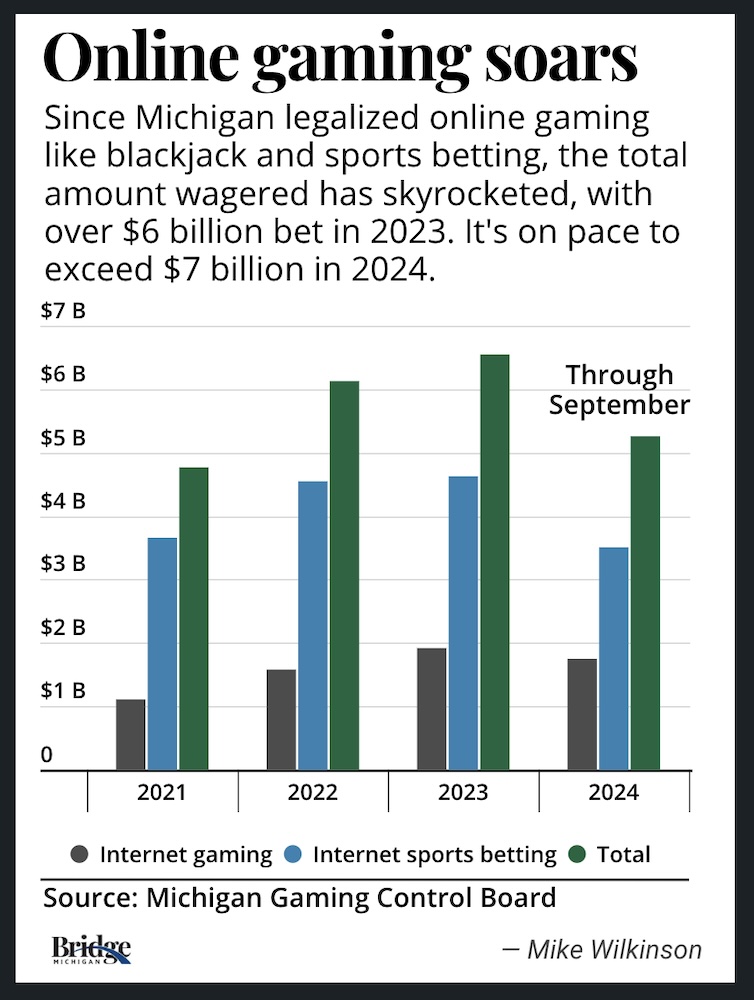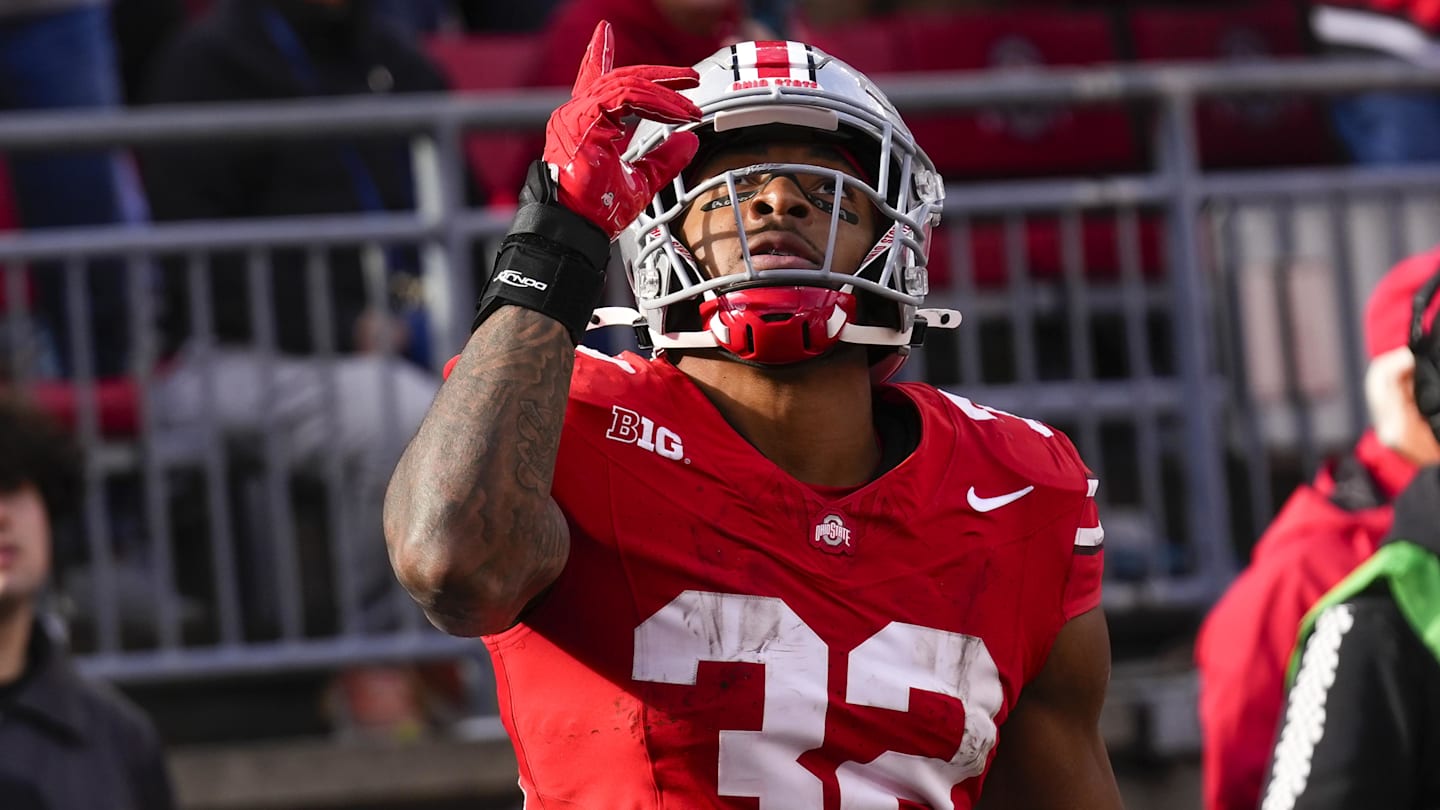Online betting increases Michigan revenue — and gambling addiction

Ads promoting online gambling sites are abundant in Michigan, including this one from BetRivers.
by Ron French (Bridge Michigan)
Casino-game and sports betting available on the phones of Michigan residents has been a huge winner for state revenues, with Michigan last year rising to first place nationwide for online gaming, but it’s also led to an explosion in problem gambling.
Calls to a state gambling helpline have more than tripled since Michigan legalized online casino games and sports betting in 2021, according to annual reports released by the state.
The number of gambling-related calls to the 24-hour helpline skyrocketed from 1,341 in the 2018-19 budget year to 4,543 in 2023-24.
In response, the state is doubling its spending on compulsive-gambling efforts from $4 million to $8 million in the budget year that began Oct. 1, with plans to increase prevention and treatment options for those suffering from gambling addiction.
How effective those efforts will be is unclear. Unlike some other states that have embraced online gambling, Michigan hasn’t conducted a study to determine who its compulsive gamblers are, where they are located and what prevention messages and treatment services will help them avoid emptying their bank accounts.
Popularity surges
In just its third year of legalized online gambling, Michigan was No. 1 in the nation in gross receipts from all that betting on phones and laptops. Total wagers reached $6.5 billion in 2023 — the equivalent of $822 gambled by every Michigander age 18 and older.
With $5.6 billion in bets in the first nine months of 2024, Michiganders are on pace to gamble $7.5 billion on their phones and laptops this calendar year.
Online gaming and sports betting has quickly become the largest gambling source in the state, surpassing in-person casino wagers ($1.2 billion in 2023) and retail sports betting ($181 million), and lottery sales ($4.9 billion).
Michigan pulled in $354 million in tax revenue from internet gambling in 2023, dwarfing initial estimates of $30 million to $40 million. The online sites are managed by Michigan private and tribal casinos. Most of that online gambling tax revenue goes to bolster the state’s roughly $20 billion School Aid Fund, which funds Michigan’s public schools.
More addiction and more ads
Caught off-guard by the popularity of online gambling, Michigan is now scrambling to catch up both in addiction research and services, said Marlene Warner, interim executive director of the Michigan Association of Problem Gambling.
“It feels like they’re out over their skis,” Warner told Bridge Michigan. “They want to figure out how they can set up a safety net. That’s good news, but it’s too bad it didn’t happen beforehand.”
Michigan is one of six states (the others are New Jersey, Pennsylvania, West Virginia, Connecticut and Delaware) that lets residents bet on poker, blackjack, slot machines and other games on their phones and computers along with betting on sports.
The same easy betting that pads state bank accounts is inflaming problematic gambling for thousands of Michigan residents, said Alia Lucas, program administrator for gambling disorder prevention and treatment services in the Michigan Department of Health and Human Services.
Online gambling “has actually impacted problem gambling significantly in the state,” Lucas said.
Most who gamble do so in moderation as entertainment, Lucas said, but for some, having gambling available at their fingertips leads to problems.
Two-thirds of people calling the helpline are males, according to state data. About 30% are in their 30s, and 21% in their 40s.
Lucas said the increase in helpline calls was sparked by the ability to gamble anyplace you can get a signal on your phone, and by a flood of advertisements for those services, from Jamie Foxx searching for inside tips for sports betting to a woman gambling while sitting on a toilet.
“You have to take into consideration the increased advertisement associated with (online gambling),” Lucas said. “For those that are already dealing with gambling concerns, it’s possibly exacerbating the concerns.”
Those concerns range from increased bankruptcy and debt collection rates among problem gamblers, to increased rates of suicide and domestic violence.
More prevention, treatment on the way
Funding for the state Compulsive Gaming Prevention Fund grew by $4 million this year to respond to increased problem gambling.
That extra funding will likely include expansion of prevention services, like the Don’t Regret the Bet marketing campaign, educational outreach into schools, and in-patient treatment. The state will continue providing up to 12 outpatient counseling sessions for compulsive gamblers, through a statewide network of about 50 providers. In the 12 months ending in September, 468 Michiganders were referred to treatment for gambling addiction counseling after calling the state’s helpline.
The additional funding “is (an) example of the steps we are taking as a state to support behavioral and mental health care, as we know compulsive gambling is often driven by addiction, underlying health disorders or substance abuse,” said Sen. Sarah Anthony, D-Lansing, chair of the Senate Appropriations committee. “We have a responsibility to ensure our state’s lottery and gaming systems are responsibly regulated, and that we always keep the best interest of Michiganders at the top of our mind.”
The money may also fund a study that will give state leaders a clearer picture of who is struggling with gambling addiction and why, so that services can be tailored to help, the state’s Lucas said.
“It’s extremely important not just to look at the overall prevalence of gambling problems throughout the state, but also to look specifically at the rates of problems among those who use online gambling,” said David Ledgerwood, who studies gambling disorder and other addictions as an associate professor of psychiatry at Wayne State University.
In New Jersey, the state sends gambling data to the Center for Gambling Studies at Rutgers University for analysis. Its 2023 study found that 6 out of 10 New Jersey adults gambled in the past year, 6% of those showed signs of gambling disorder — three times the national average.
About 15% gambled exclusively online, with one-third of gamblers aged 18 to 24 gambling online only.
Michigan was ninth among the 50 states in problem gambling spending in 2021, providing about $5.5 million for services. Massachusetts, first at more than $10 million, funds studies annually.
For now, Michigan has only the calls to its gambling helpline to gauge the extent of problem gambling in the state. Warner said that’s not enough.
“You just don’t have enough information coming in” to know how best to address the increase in problem gambling caused by online gambling, Warner said. “Massachusetts typically spends somewhere between $1 million to $2 million a year on research. Michigan is spending zero.”
“Easy access to gambling, literally available in one’s living room, makes it so much more difficult for someone vulnerable to gambling problems, or someone in recovery, to stay away from it,” Wayne State’s Ledgerwood said. “We need a wide range of services in Michigan to address problem gambling.”

This article is being republished through a syndication agreement with Bridge Michigan. Bridge Michigan is Michigan’s largest nonprofit news service and one of the nation’s leading and largest nonprofit civic news providers. Their coverage is nonpartisan, fact-based, and data-driven. Find them online at https://www.bridgemi.com/.
Related
bet365 Bonus Code POSTNEWS: Grab $150 in bonus bets or…
Gambling content 21+. The New York Post may receive an affiliate commission if you sign up through our links. Read our editorial standards for more
BetMGM Bonus Code NYP1500DM: Pocket a deposit match up to…
Gambling content 21+. The New York Post may receive an affiliate commission if you sign up through our links. Read our editorial standards for more
New Bet365 bonus code “SYRACUSE”: Upgraded $1,150 betting bonus now…
As of Monday, November 18th, 2024, the Bet365 bonus code “SYRACUSE” offers $1,000+ in welcome bonus options, ideally timed for an action-packed night featur
Maryland Chesapeake Beach Votes Overwhelmingly Against Gambling Expansion – The…
Voters in Chesapeake Beach, Maryland have voted overwhelmingly against the idea of expanding gambling regulations in the town. 1,684 chose to vote on the












